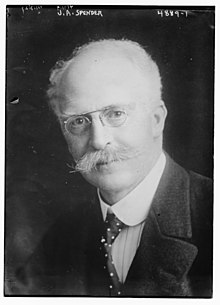J. A. Spender
J. A. Spender | |
|---|---|
 | |
| Born | John Alfred Spender 23 December 1862 |
| Died | 21 June 1942 (aged 79) |
| Education | Balliol College, Oxford |
| Occupation(s) | Journalist, editor, and author |
| Spouse | Mary Rawlinson (1892–1942) |
| Relatives |
|
John Alfred Spender CH (23 December 1862 – 21 June 1942) was a British journalist and author. He also edited the London newspaper The Westminster Gazette from 1896 to 1922.
Early life
Spender was the eldest of four sons born to John Kent Spender, a doctor, and his wife, the novelist
Editor
Though
In June 1892 Spender received an offer from
Editorship of The Westminster Gazette
Cook served as editor until 1896, when he resigned his position to take over as editor of the Liberal The Daily News. Though a number of prominent individuals applied to succeed him, the owner of The Westminster Gazette, George Newnes, decided to offer the editorship to Spender, then only 33. Spender himself was modest about his prospects, but his selection was met with approval by many in the Liberal ranks, including leader Lord Rosebery.[2]
Under Spender's direction, The Westminster Gazette never had a wide circulation nor made a profit. Nonetheless, it was the most influential evening newspaper in Britain, and Spender received the credit. Veteran editor Frederick Greenwood regarded The Westminster Gazette under Spender as "the best edited paper in London"[3] and his leaders became essential reading for politicians on both sides of the political aisle.
His priority was Liberal unity, and he balanced ideological expression in the pages of his paper, avoiding the polemical heights attained by his counterparts in other Liberal publications. That occasionally earned him the ire of both Liberal factions in a debate, but his loyalty to the Liberal leadership was rewarded with their confidences, which provided him with invaluable insight into the inner workings of contemporary politics.[4]
Spender greatly valued his editorial independence, which was never an issue with Newnes. When the latter sold the paper in 1908 to a consortium of Liberal businessmen and politicians, led by
A growing decline in circulation and revenue led Spender and the owners to undertake the radical move of switching from an evening to a morning publication in November 1921. The new paper, however, was no longer a vehicle for the sort of reflective journalism characteristic of Spender, who resigned in February 1922.[4][5]
Later life
Spender's departure from The Westminster Gazette also meant his departure from journalism, as he now pursued a new career as an author. Over the next two decades, he wrote a number of books on nonfiction subjects, including histories, travelogues, biographies and memoirs. His most prominent works were two biographies of Liberal Party Prime Ministers
He also remained involved in Liberal politics, but his influence was much diminished with the decline of the Liberal Party in the interwar period. His concern about the insufficiency of British armaments led many to brand Spender as an
Works
- The State and Pensions in Old Age (1892)
- The Comments of Bagshot (1908)
- The Life of The Right Hon. Sir Henry Campbell-Bannerman (2 vols.) (1924)
- The Public Life (2 vols.) (1925)
- Life, Journalism and Politics (2 vols.) (1927)
- (with Cyril Asquith) Life of Herbert Henry Asquith, Lord Oxford and Asquith (2 vols.) (1932)
- The Changing East (Pocket Edition 1935)
- New lamps and ancient lights (1940)
- Last Essays (1944)
- Men and things (1968)
Sources
- Brack, Duncan, ed. (1998). "J. A. Spender". Dictionary of Liberal Biography. London: Politico's Publishing. pp. 337–339. ISBN 1902301099.
- Morris, A. J. A. (2004). "Spender, John Alfred". In Matthew, H.C.G.; Harrison, Brian (eds.). The Oxford Dictionary of National Biography. Vol. 51. Oxford: Oxford University Press. pp. 900–902.
- ISBN 0807814830.
- ISBN 0807815985.
References
Further reading
- Harris, Wilson (1946). J. A. Spender. Cassell.
